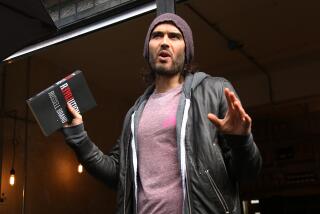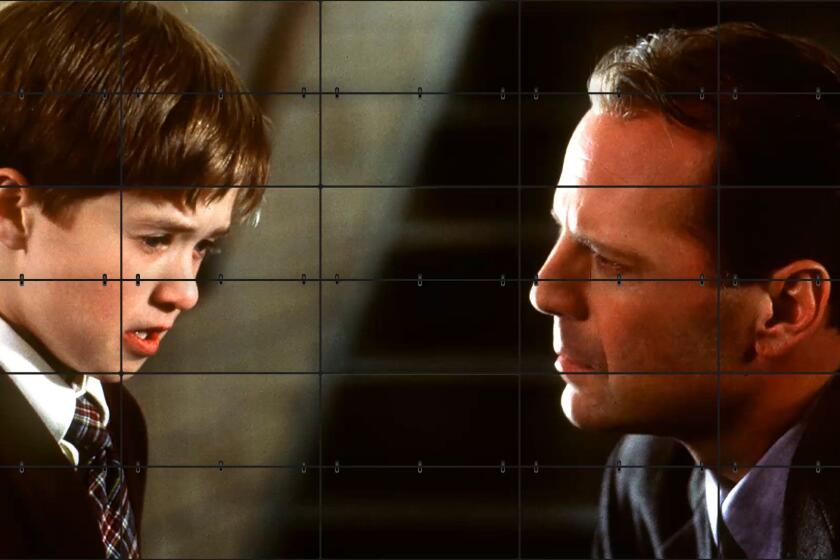A lesson served with fries
Morgan Spurlock stands at the corner of Beverly and Rampart boulevards at the site of the Original Tommy’s hamburger stand, and he’s got something surprising to say: “A chili cheeseburger and chili cheese fries, please.”
The 33-year-old New Yorker’s order may not sound unusual in a nation where one in four people dines at a fast-food restaurant every day. But why is Spurlock, who is in town to promote his documentary “Super Size Me,” a pointed attack against America’s fast-food diet and culture, eating this way in front of a reporter?
“I love burgers,” says Spurlock, whose film chronicles his 30-day eating binge at McDonald’s, a period during which he gained 25 pounds. “I just eat them maybe once every six months.”
That message -- the need for a sense of proportion in matters of diet and exercise -- is precisely the one that Spurlock hopes his film, which opens Friday, will convey. And many health professionals seem to be cheering him on. Those active in the nation’s effort to cope with rising obesity rates are excited to have, for the first time, a movie that aspires to deliver a powerful dietary message to an overweight nation.
“While this topic has clearly been on the public health radar for some time, it really hasn’t been for much of the general public,” says Dr. Charles Baum, director of the Nutrition and Disease Prevention Center at the Alexian Brothers Medical Center in Elk Grove Village, Ill. “A movie is going to raise awareness in a way that public health officials could never do on their own.”
For its part, McDonald’s calls Spurlock’s film “over the top,” “irresponsible” and a “stunt, full of distortions,” according to Walt Riker, a spokesman for the giant restaurant chain, based in Oak Brook, Ill.
“What you’re watching is gluttony and sloth,” adds Cathy Kapica, McDonald’s director of global nutrition, who says she has actually viewed the film. “It’s about extreme behavior, and it’s a lost opportunity in terms of encouraging smart choices in diet and exercise.”
Spurlock acknowledges that the situation depicted in the film -- eating every meal for a month at McDonald’s -- is unrealistic. Still, he says it is instructive considering the dietary habits and lifestyles of many Americans.
In the film, Spurlock states that almost a quarter of McDonald’s customers dine at the restaurant more than three times per week. And, he points out, Americans spend almost half of their food budget on eating out, while recent research has shown that the portion sizes and calorie counts of restaurant meals are considered major contributors to America’s obesity epidemic.
“So when they’re not eating at McDonald’s, they’re either at another fast-food place or something like the Outback Steakhouse,” says Spurlock. “Am I supposed to believe the rest of the time, then, they’re at home eating tofu and brown rice?”
To further mimic the average American, Spurlock sharply reduced his physical activity during filming. The average American walks only about 2,000 steps per day, so Spurlock stopped riding his bicycle to and from work in New York City -- roughly a 5-mile round trip -- and didn’t go to the gym several times a week, as was his habit.
The McDonald’s diet coincided with dramatic changes in Spurlock’s health and appearance. His body fat composition went from 11% to 18%. His blood pressure rose from 120/80 to 150/100. His total cholesterol shot up from 165 to 230.
He also complained of mood swings, heart palpitations and chest pains. After three weeks he developed a fatty liver, unable to efficiently metabolize the excessive accumulation of triglycerides flooding his system. Three doctors monitoring his health during the 30-day period urged him to quit his experiment immediately to safeguard his health.
“What the film represents is a fast-forward of people’s lives,” says Spurlock. “If you eat a high-fat, high-sugar diet and overconsume and underexercise, you will probably be shaving 10, 20, maybe 30 years off your life span because of something you have control over today.”
Weight gain for most people is, of course, far less theatrical than it was for Spurlock. Most tend to gain a pound or two a year that, left unchecked, can result in becoming overweight or obese.
“It creeps up on you,” Baum says. “The health effects are insidious.”
Overweight resulting from poor eating habits and sedentary lifestyles accounts for about 400,000 deaths per year, making it second only to tobacco use or exposure as the leading preventable cause of death in the United States.
Spurlock and McDonald’s do agree on one point: the need to make nutrition information more easily available for the restaurant’s customers. Spurlock couldn’t find nutritional charts at half of the McDonald’s outlets in Manhattan. “You can’t call for personal responsibility and not have nutritional information,” he says.
McDonald’s Riker says every U.S. outlet should have that information readily available to customers. By the end of the year, all tray liners at every McDonald’s in the nation will have nutritional information printed on them, he says.
The information can also be found on the McDonald’s website, www.mcdonalds.com, or by calling the company’s toll-free number, (877) 623-3663.
Recovering from the fast-food diet was almost as difficult as starting it, says Spurlock. His girlfriend, Alexandra Jamieson, a vegan chef who also appears in the film, placed him on a special diet that eliminated all dairy, meat, sugar, caffeine and refined carbohydrates.
Instead he ate lots of fresh vegetables and drank vegetable juice and water. In an effort to determine the role of diet in his weight gain, he maintained his low level of physical activity. After two months, he dropped 10 pounds.
The remaining 15 pounds came off more slowly. He quit the vegan diet and started eating a wide range of foods, including meat, as he had done before the filming. He says he didn’t deny himself any foods but concentrated on keeping portion sizes small. It was only two weeks ago -- some 14 months later -- that he finally lost all the weight.
“It was one of those things where I’d take off two pounds and gain back three,” says Spurlock, who has resumed going to the gym and commuting to work by bike. “It was really hard to lose the weight.”
Spurlock hopes his film will illuminate two factors that many experts believe are key to rising rates of childhood obesity: school lunches and a lack of physical education. The film shows what’s commonly served at school lunch counters and, as Spurlock describes it, they “look like a 7-11 store” -- pizza, cheeseburgers, French fries and high-sugar desserts and drinks.
Spurlock believes his message has been heard at McDonald’s corporate offices. The company plans to roll out new “Go Active!” meals for grown-ups Thursday -- a day before the release of Spurlock’s film. The new menu includes a salad, bottled water and a pedometer, used for measuring how many steps you walk.
“I’m sure,” says Spurlock, “that it’s just an amazing coincidence.”
But McDonald’s says that’s wishful thinking on Spurlock’s part. “It’s not true,” says Riker, noting that the trials for the meal were conducted in October 2003.
More to Read
Only good movies
Get the Indie Focus newsletter, Mark Olsen's weekly guide to the world of cinema.
You may occasionally receive promotional content from the Los Angeles Times.







